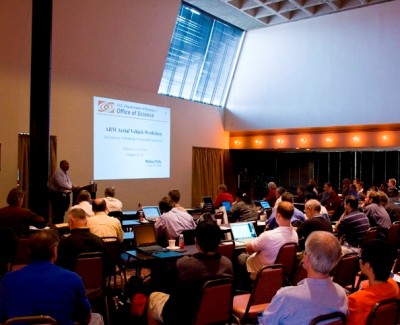Airborne Instrumentation Workshop Seeks Latest Scientific Advances
Published: 15 November 2008

The ARM Aerial Vehicles Program (AVP) sponsored a workshop on aircraft instrumentation at the University of Illinois in Urbana-Champaign, Illinois, on October 14-16, 2008. About 65 people from the United States, Canada, and Europe attended the workshop, which featured more than 40 presentations and about a dozen posters covering airborne instrumentation for remote sensing and in situ measurements of aerosols, clouds, radiation, and atmospheric state parameters. In addition, participants also discussed existing and emerging technology for uninhabited aerospace systems, including platforms, instruments, and data recording systems. On one evening, several of the participants gathered at the Champaign Willard Airport to review the capabilities of NOAA’s Cessna 206—an example of the many instrumented aircraft choices available for field campaigns.
The goals of the workshop were to:
- identify state-of-art measurement techniques for aerosols, clouds, radiation and atmospheric state parameters;
- determine emerging instruments and developing technologies in these areas that can be made flight ready and reach maturation within an approximately 1-year time period; and
- identify measurements needs for existing gaps in airborne instruments capabilities that are needed to answer key science questions in climate science.
At the conclusion of the workshop, a steering committee convened to review the discussions throughout the three days and develop guidance for the 2011 call for proposals. The call specifies guidance for maturation/hardening of existing aircraft instrumentation, including calibration and characterization of instruments in flight tests, wind tunnels or environmental chambers, and identifying examples of aircraft instrumentation of particular interest to AVP. The AVP expects to award 5-6 proposals with one year of funding, between $50K and $300K each, for these activities.
The ARM Climate Research Facility is a DOE Office of Science user facility. The ARM Facility is operated by nine DOE national laboratories, including .
Keep up with the Atmospheric Observer
Updates on ARM news, events, and opportunities delivered to your inbox
ARM User Profile
ARM welcomes users from all institutions and nations. A free ARM user account is needed to access ARM data.


















